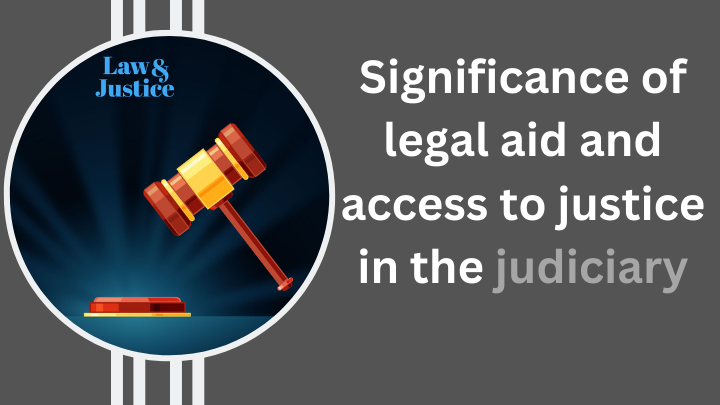In the words of Justice P.N. Bhagwati, “Legal Aid” means providing an arrangement in the society so that the mission of administration of justice becomes easily accessible and is not out of reach of those who have to resort to it for enforcement… the poor and illiterate should be able to approach the courts, and their ignorance and poverty should not be an impediment in the way of their obtaining justice from the courts. Legal aid should be available to the poor and illiterate, who don’t have access to courts. “One need not be a litigant to seek aid by means of legal aid.”
We will discuss some of the points which show the importance of the legal aid in individual lives:
Equality before the law
The law is the ultimate authority in protecting individual rights. It ensures equality before the law, meaning that the law is equal for all, regardless of their social standing or status. The right to equality is a fundamental right that applies to both citizens and non-citizens alike. In cases where legal aid is necessary, it is important to ensure that justice is fairly, regardless of the individual circumstances involved.
Protection of rights
When any right is infringed for the any reason then judiciary is the lord for the protecting of the rights of the people. For the protection of the rights victim can take help from the litigants who knows the law very well. Free Lok Adalats is also organised in the courts for the people who cannot afford the expensive fees of the lawyers.
Legal empowerment
It is crucial to understand that legal development plays an important role in the country for the welfare of the people. It makes the empowerment of law for the rights protection. Legal matters are handled by the district legal service authority, state and national authorities, and committees.
Trust Legal system
People who feel confident for the law and they will find justice as same in the case. It is not to compulsory to force for the law but law is the protector of the rights. New advancements can be noticed easily after the Covid. The justice system becomes the hybrid mode, and people can raise their voice through the technological way.
Article 39A of Indian Constitution
The State shall secure that the operation of the legal system promotes justice, on a basis of equal opportunity, and shall, in particular, provide free legal aid, by suitable legislation or schemes or in any other way, to ensure that opportunities for securing justice are not denied to any citizen by reason of economic or other disabilities.
Eligibility Criteria for Free Legal Aid
Section 12 of the Legal Services Authorities Act, 1987 lists the persons who are entitled to free legal aid and it includes:
- a member of a Scheduled Caste or Scheduled Tribe
- a victim of trafficking in human beings or beggars
- a woman or a child
- a person with disability as defined in Section 2 of the Persons With Disabilities (Equal Opportunities, Protection of Rights and Full Participation) Act, 1995
- a person under circumstances of underserved want such as being a victim of a mass disaster, ethnic, violence, caste atrocity, flood, drought, earthquake or industrial disaster
- an industrial workman
- in custody, including custody in a protective home
- If the case is before Supreme Court - in receipt of annual income less than Rs 5 Lakh and if the case is before a court other than the Supreme Court than in receipt of annual income as may be prescribed by the State Government.
Case Laws
Sukh Das vs. union territory of Arunchal Pradesh
The Court ruled that the defendant was not informed of their right to free legal assistance and did not have a lawyer present during their trial. As a result, the conviction and sentence were invalid due to a constitutional error. While the law requires a retrial with the defendant receiving legal aid, the Court determined that a new trial was unnecessary in this case. By doing so, the Court ensured a fair trial and upheld the Constitution's intent.
Hussainara Khatoon vs. State of Bihar
The case exposed the poor condition of the justice delivery system in Bihar state. Numerous under trials were forced to remain in jails, while some accused were wrongfully convicted and received greater punishment than they deserved. The primary reason behind these delays was the inability of the convicted person to hire an advocate to defend them. Justice P.N. Bhagwati held that the right to free legal service is an essential part of a "reasonable, fair, and just" procedure for a person accused of any offense, guaranteed by Article 39A and implicit in Article 21.



